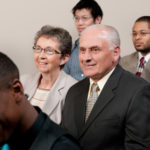NASHVILLE, Tenn.—More than half of Americans plan to go to church at Christmastime, and most Protestant pastors will keep the doors open for them.
Nearly nine out of 10 Protestant senior pastors say their churches plan to hold Sunday services on Christmas Day and New Year’s Day, a recent survey from LifeWay Research revealed.
 More than seven in 10 Protestant senior pastors say their churches plan to hold Christmas Eve services. And more than a few will be open on New Year’s Eve.
More than seven in 10 Protestant senior pastors say their churches plan to hold Christmas Eve services. And more than a few will be open on New Year’s Eve.
“Christmas is one of the busiest times of the year, especially at churches, with many churches having extra Christmas Eve services and special programs,” said Scott McConnell, executive director of LifeWay Research.
“If Christmas falls on Monday through Saturday, churches might be closed on Dec. 25—but almost never on a Sunday.”
The Christmas season has become a major outreach focus for many churches, with more than half of Americans saying they visit church for Christmas. Many of those who usually don’t go to church are open to an invitation during the holidays, previous LifeWay Research studies showed.
At some influential megachurches, thousands of visitors flock to special Christmas events. In the past, that’s led some to cancel worship when Christmas falls on a Sunday.
Most churches will gather for worship on Christmas
But few pastors seem to follow their example, according to LifeWay Research’s phone survey of 1,000 Protestant senior pastors. Eighty-nine percent say their church will hold services on Christmas Day.
Sign up for our weekly edition and get all our headlines in your inbox on Thursdays
Leaders of Lutheran (94 percent), Church of Christ (93 percent), Baptist (91 percent), Presbyterian/Reformed (91 percent) and Holiness (92 percent) churches are most likely to say their church will hold Christmas Day services. Pentecostals (79 percent) are less likely.
Small churches and large churches are slightly less likely than mid-sized churches to be open for Christmas.
Eighty-four percent of pastors whose churches have fewer than 50 attenders say their church will hold services on Christmas. So do 85 percent of pastors with more than 250 attenders. Among pastors of mid-size churches—those with 100 to 249 attenders—92 percent say their church will hold Christmas Day services.
Pastors in the Midwest (92 percent) and South (89 percent) are more likely to say their church will be open on Christmas. Pastors in the West (83 percent) are less likely.
African-American churches favor New Year’s Eve Watch Night services
Most senior pastors (85 percent) also say their church will hold Sunday worship services on New Year’s Day. Leaders of Presbyterian/Reformed (92 percent) and Church of Christ (95 percent) congregations are more likely to say their churches will be open. Lutheran (81 percent), Holiness (75 percent) and Pentecostal (72 percent) pastors are less likely.
LifeWay did find some demographic differences in attitudes among pastors. White pastors (86 percent) are more likely to say their church will worship on New Year’s Day. African-American pastors (65 percent) are less likely.
By contrast, almost half of African-American pastors (47 percent) say their church will hold services on New Year’s Eve. Overall, only a quarter of pastors say their church will be open on New Year’s Eve.
New Year’s Eve services, known as Watch Night, began with the Moravians in the 1700s and later were picked up by Methodists. African-American churches trace their tradition of holding services on New Year’s Eve to “Freedom’s Eve” in 1862, when congregations counted down until the Emancipation Proclamation took effect with the start of a new year.
African-American pastors also are less likely to say their church will hold services on Christmas Eve (50 percent). By contrast, 71 percent of all pastors say their church will hold Christmas Eve services.
Responses vary by congregational size and denomination
Pastors of larger churches—those with 250 or more attenders—are more likely to say their church will have Christmas Eve services than pastors of small churches (64 percent) with fewer than 50 attenders.
Christmas Eve services are more popular with pastors in the Northeast (86 percent) than with pastors in the Midwest (77 percent), West (71 percent) or South (63 percent).
Lutheran (93 percent), Methodist (90 percent) and Presbyterian/Reformed (85 percent) churches are more likely to have a Christmas Eve service, according to their pastors. Baptist (65 percent), Holiness (62 percent), Pentecostal (54 percent) and Church of Christ (46 percent) congregations are less likely.
Among other findings:
- Two-thirds (63 percent) of Protestant churches will have services on both Christmas and Christmas Eve.
- A quarter of churches will have only a Christmas Day service.
- Eight percent of churches will have only a Christmas Eve service.
- One church in five will have services on both New Year’s Eve and New Year’s Day.
- Two-thirds (65 percent) of churches will have only a Sunday worship service on New Year’s Day.
- Five percent of churches will have only a New Year’s Eve service.
Previous LifeWay Research found nearly two-thirds (63 percent) of Americans say churchgoing should be part of Christmas. About six in 10 say they usually show up for a church service for Christmas. Among those who skip church at Christmas, 57 percent would accept an invitation to attend a service.
The Christmas story remains a symbol of hope for many people, even those who don’t regularly go to church, McConnell said. The story keeps drawing people back, he said, because it helps them connect with the core message of the Christian faith.
“The incarnation of Jesus is one of the greatest celebrations of hope that Christian churches observe,” McConnell said. “It is amazing enough that God himself would become a man. But because Jesus paid the ransom for people’s sin, his arrival became the birth of hope for all mankind.”
Researchers conducted the phone survey of Protestant pastors Aug. 22 to Sept. 16. The calling list was a stratified random sample, drawn from a list of all Protestant churches. Quotas were used for church size. Each interview was conducted with the senior pastor, minister or priest of the church called.
Analysts weighted responses by region to reflect the population more accurately. The completed sample is 1,000 surveys, providing 95 percent confidence the sampling error does not exceed plus or minus 3.2 percent. Margins of error are higher in sub-groups.














We seek to connect God’s story and God’s people around the world. To learn more about God’s story, click here.
Send comments and feedback to Eric Black, our editor. For comments to be published, please specify “letter to the editor.” Maximum length for publication is 300 words.